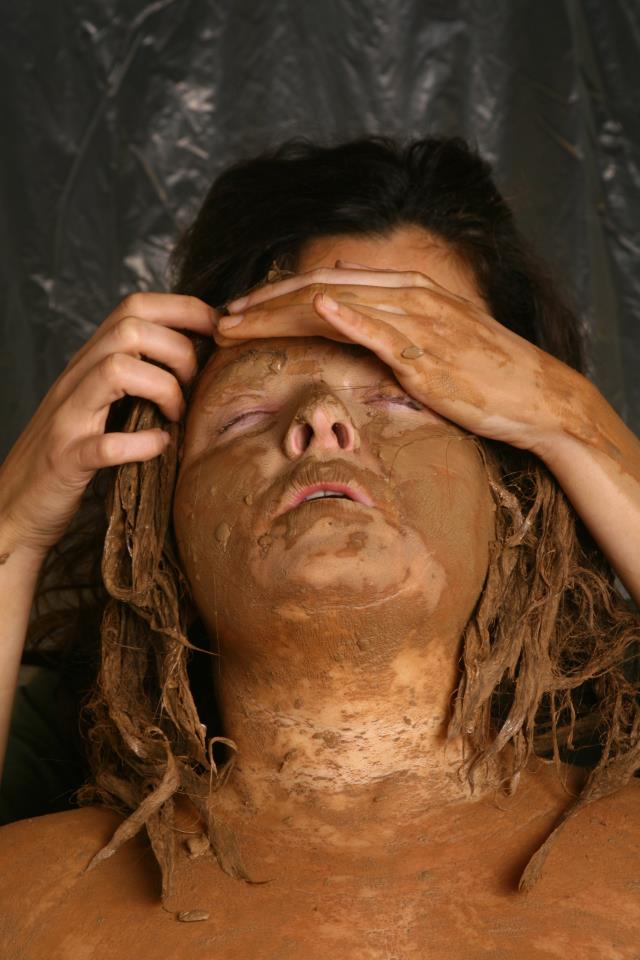
In an exciting Scottish comeback, Edinburgh-based multilingual Fronteiras Theatre Lab (fronteira meaning ‘border’ in Portuguese) is set to bring their intimate physical theatre show La Niña Barro to Assembly Roxy this spring for an exciting three day run from 7 – 9 March 2024, coinciding with International Women’s Day.
An ongoing and cumulative creative project first formed in 2013, this run marks a decade since La Niña Barro’s original premier at the 2014 Edinburgh Festival Fringe. The performance will feature the original crew and cast, including Director and Producer Flavia D’Avila and lead actress Elizabeth Sogorb as the clay woman.
Created from introspective poems written by Spanish writer Marta Massé, La Niña Barro explores the experience and feelings of a woman made from mud; probing how she feels about and relates to herself, earth, nature, life, and love through a raw and intimate mix of skilled Mbira (traditional Zimbabwean thumb piano) music by artist and performer Alexandra Rodes, moving spoken word, and deeply felt physical theatre.
A performance enacted fully in the nude and spoken in the Spanish language, La Niña Barro creates a sensitive, impactful experience for audiences – asking us to embrace and reflect on what makes us human as the clay woman bears her soul and self.
We caught up with the entire team to find out more.
Q&A with Fronteiras Theatre Lab
What is it like to be returning to the Scottish stage?
Elizabeth: It feels liberating to do it without restrictions this time around!
Marta: I love Scotland, it’s like coming home – I miss it!
Alex: It actually feels like we’ve come full circle and are going back to where it all began, all those initial conversations, a new encounter with ourselves.
Flavia: I am based in Edinburgh and have been doing other work here since LNB. But bringing this show back this year just feels… right.
You’re also bringing the original cast and crew of the show back together – how special does that feel?
Alexandra: I think the show has always followed us like a shadow, it never left us. That which has to do with thoughts, identity, and mirrors keeps manifesting and giving us that subtle outlook on these themes. So it feels very special, but it also feels like we never really took time away.
Flavia: I think it will feel like a re-birth, a second coming. Marta [the writer] said that La Niña Barro is herself and someone else at the same time, and I think this is more or less how it feels. It’s the same show, but it’s a different show. And I’m sure it will be very emotional.
Elizabeth: I don’t even know what to tell you… I’ve been experiencing everything between extreme excitement and maximum fear…!
What was it that originally inspired La Niña Barro?
Marta: Simply naked feelings. Not having the right words and images in our world to explain what is deeply instinctive, the essence of losing oneself and then the piercing sensation of finding oneself again.
Has the show changed over the last decade?
Alex: Eli, much like the clay girl, took one look in the mirror and chose to change, reshape something in herself: her body. Four years ago, she went under the knife for a bariatric surgery, and embarked on a weight loss journey that has been slow, long, and demanded a huge sacrifice. We now have this transformation to consider and reflect upon. We have the different meanings of coming to terms with oneself, but also defying a society that imposes restrictions, demands, and judgments on every individual and being. We are still fighting for the right to have the same identity crises, we are still discovering the world.
Elizabeth: I have scars now that I didn’t have last time we performed. I am smaller, lighter, I see my belly, my breasts, my skin, differently. I have seen my skin change colours between blue, purple, red, but most of the battle is internal for me, I constantly ask myself so many questions. This is why I want to cover myself in clay again and speak La Niña’s lines again, because she takes me back to that cave, the beginning, silence and contemplation, and helps me see what is really important.
Flavia: The show hasn’t changed, but we have. And society around us has changed considerably, so I’m very keen to see how it resonates in the current context.
Is there anything you hope audiences take away from the play?
Elizabeth: Questions. Doubts. Challenges to their own preconceptions and opinions.
Flavia: An appreciation for wherever they are in their lives.
Alex: I’m not big on lessons and teachings when it comes to art, I don’t think it’s very useful to think that way. What we offer is a perspective, or rather, the result of a collective work and feelings coming from various perspectives, from the 3 of us with the staging, plus Marta’s texts. Of course, I welcome people’s opinions, but more than that, I want them to experience sensations. That’s what I think the show is, an experience.
Marta: I want them to allow themselves to be overcome by their feelings. I hope they can look inside themselves and find La Niña there, that they can see that we are all little clay people that are built and destroyed every day with our own hands in this world that often seems very strange to us all.















